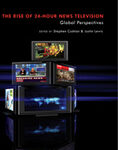This article appeared in a ground-breaking book edited by two eminent media academics from Cardiffe School of Journalism. With leading international media scholars from around the world, it explored the diverse ways in which round-the-clock news channels have reshaped the genre of news and, in a broader sense, the impact they have had on democracy itself. My article explored what this meant in India.
Reviews of this book:
This outstanding new collection gives us both historical insight and geographical and intellectual diversity – stay tuned.
– Professor Toby Miller, University of California, Riverside
This panoramic, global work is smart, thoughtful, and exhaustive, the antithesis of the in-depth trivia and fast-breaking rumor, innuendo and speculation that much of 24-hour news has become. I am mightily impressed by the laser focus and scholarship
Howard Rosenberg, Pulitzer Prize–winning journalist, co-author of ‘No Time to Think: The Menace of Media Speed and the 24-hour News Cycle’
From a variety of perspectives, and with admirable clarity, the chapters explore the development of 24/7 news, its technology, economics and politics. Most importantly, with its wide-ranging topics and the diversity of angles, the book illuminates the significance of this genre for the values and practices of journalism, for audiences, and for democracy itself. Engaging and accessible, this is truly a welcomed contribution.
Peter Dahlgren, Lund University, Sweden
This account of the rise of instantly disposable news is revealing about changes in the culture and practice of journalism, and also for a reappraisal of globalisation. De-westernising journalism studies in an intelligent way, this book deserves to be read around the world.
Professor James Curran, Goldsmiths, University of London



